

Dare to declare capitalism dead – before it takes us all down with it. For most of my adult life I’ve railed against “corporate capitalism”, “consumer capitalism” and “crony capitalism”. It took me a long time to see that the problem is not the adjective but the noun. While some people have rejected capitalism gladly and swiftly, I’ve done so slowly and reluctantly. Part of the reason was that I could see no clear alternative: unlike some anti-capitalists, I have never been an enthusiast for state communism. I was also inhibited by its religious status. To say “capitalism is failing” in the 21st century is like saying “God is dead” in the 19th: it is secular blasphemy.
But as I’ve grown older, I’ve come to recognise two things. Capitalism’s failures arise from two of its defining elements. Those who defend capitalism argue that, as consumption switches from goods to services, economic growth can be decoupled from the use of material resources. A system based on perpetual growth cannot function without peripheries and externalities. Denaro Vs. Valuta - I segreti nascosti del denaro Ep 1 - Mike Malo Sub ITA. Forbes Welcome. The Crash Course. The Crash Course has provided millions of viewers with the context for the massive changes now underway, as economic growth as we've known it is ending due to depleting resources.

But it also offers real hope. Those individuals who take informed action today, while we still have time, can lower their exposure to these coming trends -- and even discover a better way of life in the process. We'll show you how. 85 Super Wealthy People Have More Money Than The Poorest 3.5 Billion Combined.
Submitted by Michael Snyder of The Economic Collapse blog,
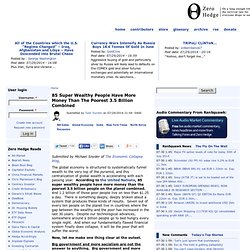
High Inequality Results in More US Deaths than Tobacco, Car Crashes and Guns Combined. In 2009, the British Medical Journal (BMJ) published a study that revealed what seems to be a shocking truth: those who live in societies with a higher level of income inequality are at a greater risk for premature death.
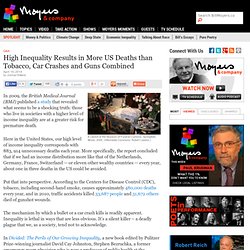
Here in the United States, our high level of income inequality corresponds with 883, 914 unnecessary deaths each year. More specifically, the report concluded that if we had an income distribution more like that of the Netherlands, Germany, France, Switzerland — or eleven other wealthy countries — every year, about one in three deaths in the US could be avoided. Put that into perspective. According to the Centers for Disease Control (CDC), tobacco, including second-hand smoke, causes approximately 480,000 deaths every year, and in 2010, traffic accidents killed 33,687 people and 31,672 others died of gunshot wounds. The mechanism by which a bullet or a car crash kills is readily apparent.
It's official! Economics students are being misinformed, says Bank of England. Written by Graham Hodgson (Guest Author) on .
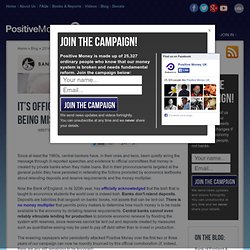
Since at least the 1960s, central bankers have, in their ones and twos, been quietly airing the message through ill-reported speeches and evidence to official committees that money is created by private banks when they make loans. What's Wrong with the Money Multiplier Model? (Banking 101 Part 2) Money creation in the modern economy - Quarterly Bulletin article. Misconceptions around Banking - Banking 101 (Part 1 of 6) Economic Science and the Debt Crisis (Vetenskapens Värld 19-11-2012) - English subtitles. Change to UK's money system could solve our long-term economic problems. Paper notes and metal coins make up just 3% of all the money in the UK.
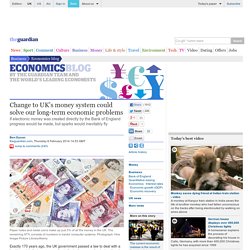
The remaining 97% consists of numbers in banks' computer systems. Photograph: Hire Image Picture Library/Alamy Exactly 170 years ago, the UK government passed a law to deal with a banking crisis that was uncannily similar to the one we've just endured. Updating that law may hold the key to preventing the crisis from happening again. The Bank Charter Act 1844 prohibited anyone other than the Bank of England from printing paper money.
Naturally, banks found it hard to resist the temptation to make more loans by simply printing more paper money. 97% Owned - Positive Money Cut. Inequality: Why are the rich getting richer? There Are 85 People Who Are As Wealthy As Half The WORLD, Oxfam Reports. Trickle-down economics is the greatest broken promise of our lifetime. The richest 85 people in the world have as much wealth as the poorest 3.5 billion – or half the world's entire population – put together.
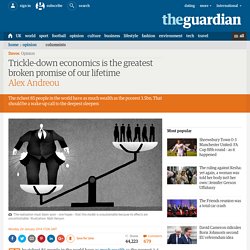
This is the stark headline of a report from Oxfam ahead of the World Economic Forum at Davos. Is there a reason why the world's powerful, gathering at the exclusive resort to sip cognac and eat blinis, should care? Well, yes. If one subscribes to the charitable view that neoliberal philosophy was simply naive or misguided in thinking that "trickle down" would work infinitely, then evidence that it doesn't, should be cause for concern.
It is a fundamental building block of supply-side economic theory – the tool of choice these past few decades for those in charge to make adjustments. Could These 3 Simple Changes to Banking Fix the Economy? Debt Problems: Why is There So Much Debt? Before the financial crisis, 97% of money in the UK was created by private banks making loans.

The only way to get extra money into the economy is to borrow it from banks, leaving us all trapped under a mountain of personal debt and mortgages. 1. Banks create new money when people go into debt When you take out a loan, new money is created. As people borrow more, more new money comes into the economy. 2. Because banks create money when people borrow, for every pound of money in the economy there will be a pound of debt.